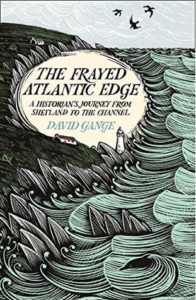My rating: 4.75 of 5 stars
David Gange’s The Frayed Atlantic Edge posits that the trajectory of mapping human experience has moved inland over time. We have lost the presence of the coast(line) in economic, social and historical appreciation of the human journey. This deliberate erasure has mirrored the development of the modern state. As our own lived and perceived world has expanded through communication and information technologies, and become subject to the tentacles of the modern state, the imposed power and authority of stateship has led to strict delineation, definition and standardisation. These are the tools and necessary ingredients for effective governance of modern nations but are an ineffective means to capture and harness the essence of human experience or the totality of existence.

His is an intriguing hypothesis. Aspects of this are an increasingly popular approach to interdisciplinary scholarship in the humanities. Gange cites the growing embrace of deep mapping, for example, as one attempt to recapture these lost experiences. It’s about layers – known and undiscovered. He draws upon a vivid profusion of historians, sociologists, geographers, poets, artists and writers whose contributions have been little known or unidimensionally understood. Gange unpacks previously hidden layers or facets like veins of rich but buried mineral deposits in the creative strata. Many would have had niche followings and existed on the edge – much like the coastlines. The contributions illuminate, augment and the author’s experience and coastline and contributor alike are restored from periphery to appreciation as connectors and glue.
The reader is captured immediately by the author’s bold commitment to kayak along the Atlantic waters of Scotland, Ireland and Wales (two fingers up to the England-centric past writing of these locales’ histories). Gange seeks to undertake his research by doing, being, experiencing, discussing, reflecting, and ultimately living his hypothesis. He embarks on discovery through exploration – there is a beautiful openness to the experience and not the experiment. Over two week physically challenging and usually solo journeys, he lives rough, on the sea and along the coastlines. This project is genuinely research-driven scholarship in the most real personal experiential sense.
There are some deep profundities in this book. Although I admit to occasional ambivalence about the delivery, Gange’s messages tap into your experience and reception by design and undoubtedly will be mixed. Sometimes, things just are not going to resonate. Clearly, the landscape and the peoplescape the author encountered on the various journeys he undertook, coloured his delivery – as it well should. The resulting work is an intimate and personal evocation of the author’s experiences and his reflections. It is deeply coloured by his reaction and brilliantly shared. It is very first-person, and the entire project, captured in prose, poetry and photography is evocative. It is thought-provoking, and it will be massively subjective and reflective of the reader’s own experience, and that is the point for me.
Gange’s tact is to provide the journal of his experience in the first instance, attempting to capture the emotions and immediate reaction and then return to draw the more overarching reflections and conclusions following his journeys. He spends more time and thought in some areas than others and goes deep down some rabbit holes of exploration. Sometimes this may feel somewhat self-indulgent. As said it’s personal, and the reader has to actively give and take, receive or reject, but cannot take a passive role.
As a good book should, this one challenges the reader’s own beliefs and seeks to provoke and challenge. Doing so is not an easy task. Far too often, the path is comfortable, enjoyable, and pleasurable – far too easy. The reader is led and submerged in a tale well told. The author needs to engage deeper to move to the next level. Gange accomplishes this. I found at times that I drifted from some of his tangents, and in others, I was so drawn in, I craved more. The read was a journey, but reflective of my own rather as much as the author’s experience. He offers this work as a gift that I don’t think can be rejected by a reader. But when taken in lived with and absorbed thoughtfully creates a relationship that grows and develops in its own and uniquely personal way.
I will come back to re-read and re-consider many aspects of this book. My note taking and highlighting was copious. It has reinforced some of my superficial thinking around trusting the journey and the importance of process, not outcome. Gange’s thoughts around representation (particularly cartesian versus personal vernacular) are particularly striking. Shorelines in a single dimension diminutise and continue to reduce human appreciation and avoid inspiration. They serve disembodied administrative needs but dehumanise the experience of our lived existence. How can we dig into our innate powers of perception and resulting representation to share and engage rather than to merely define and instruct?
